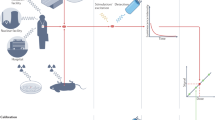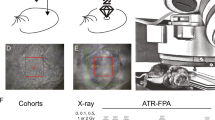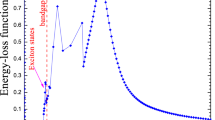Abstract
IN 1949, Day and Stein1 pointed out that doses of ionizing radiations of the order of 20,000 r. could be measured by estimating the phenols produced in dilute aqueous solutions of benzene. They estimated the phenols colorimetrically using the Folin–Ciocalteu reagent. In this method, the conditions under which the blue colour is developed must be carefully controlled, since its rate of production, maximum intensity and stability depend upon the freshness of the reagent and the pH and temperature of the solution.
This is a preview of subscription content, access via your institution
Access options
Subscribe to this journal
Receive 51 print issues and online access
$199.00 per year
only $3.90 per issue
Buy this article
- Purchase on Springer Link
- Instant access to full article PDF
Prices may be subject to local taxes which are calculated during checkout
Similar content being viewed by others
References
Day, M. J., and Stein, Gabriel, Nature, 164, 671 (1949).
Author information
Authors and Affiliations
Rights and permissions
About this article
Cite this article
CARR, M. A Simplified Chemical Method of Radiation Dosimetry. Nature 167, 363–364 (1951). https://doi.org/10.1038/167363a0
Issue Date:
DOI: https://doi.org/10.1038/167363a0
Comments
By submitting a comment you agree to abide by our Terms and Community Guidelines. If you find something abusive or that does not comply with our terms or guidelines please flag it as inappropriate.



